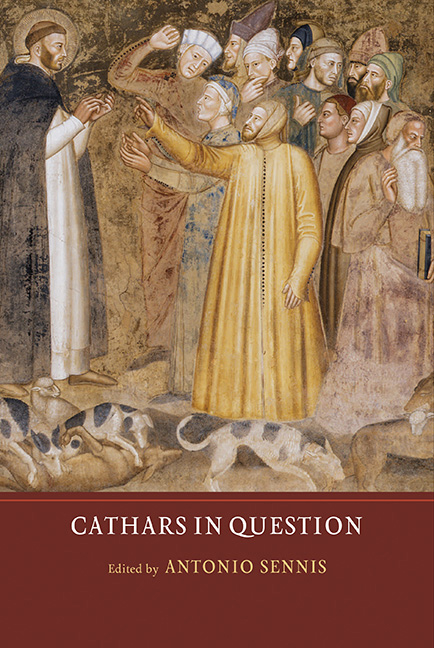Book contents
- Frontmatter
- Contents
- Acknowledgments
- 1 Questions about the Cathars
- 2 The Paradigm of Catharism; or, the Historians’ Illusion
- 3 The Cathar Middle Ages as a Methodological and Historiographical Problem
- 4 The Heretical Dissidence of the ‘Good Men’ in the Albigeois (1276–1329): Localism and Resistance to Roman Clericalism
- 5 The Heretici of Languedoc: Local Holy Men and Women or Organized Religious Group? New Evidence from Inquisitorial, Notarial and Historiographical Sources
- 6 Cathar Links with the Balkans and Byzantium
- 7 Pseudepigraphic and Parabiblical Narratives in Medieval Eastern Christian Dualism, and their Implications for the Study of Catharism
- 8 The Cathars from Non-Catholic Sources
- 9 Converted-Turned-Inquisitors and the Image of the Adversary: Ranier Sacconi Explains Cathars
- 10 The Textbook Heretic: Moneta of Cremona's Cathars
- 11 ‘Lupi rapaces in ovium vestimentis’: Heretics and Heresy in Papal Correspondence
- 12 Looking for the ‘Good Men’ in the Languedoc: An Alternative to ‘Cathars’?
- 13 Principles at Stake: The Debate of April 2013 in Retrospect
- 14 Goodbye to Catharism?
- Index
- Miscellaneous Endmatter
6 - Cathar Links with the Balkans and Byzantium
Published online by Cambridge University Press: 31 March 2017
- Frontmatter
- Contents
- Acknowledgments
- 1 Questions about the Cathars
- 2 The Paradigm of Catharism; or, the Historians’ Illusion
- 3 The Cathar Middle Ages as a Methodological and Historiographical Problem
- 4 The Heretical Dissidence of the ‘Good Men’ in the Albigeois (1276–1329): Localism and Resistance to Roman Clericalism
- 5 The Heretici of Languedoc: Local Holy Men and Women or Organized Religious Group? New Evidence from Inquisitorial, Notarial and Historiographical Sources
- 6 Cathar Links with the Balkans and Byzantium
- 7 Pseudepigraphic and Parabiblical Narratives in Medieval Eastern Christian Dualism, and their Implications for the Study of Catharism
- 8 The Cathars from Non-Catholic Sources
- 9 Converted-Turned-Inquisitors and the Image of the Adversary: Ranier Sacconi Explains Cathars
- 10 The Textbook Heretic: Moneta of Cremona's Cathars
- 11 ‘Lupi rapaces in ovium vestimentis’: Heretics and Heresy in Papal Correspondence
- 12 Looking for the ‘Good Men’ in the Languedoc: An Alternative to ‘Cathars’?
- 13 Principles at Stake: The Debate of April 2013 in Retrospect
- 14 Goodbye to Catharism?
- Index
- Miscellaneous Endmatter
Summary
‘In the days of the good Christian Tsar Peter [927–69], there was a priest [pop] called Bogomil […] who started for the first time to preach heresy in the country of Bulgaria.’ So wrote Cosmas the Priest in his Discourse against the Bogomils. Pop Bogomil was a moderate dualist, who taught that there was only one creator God, who had two sons, Christ and Lucifer. Lucifer had fashioned the phenomenal world from the elements created by the good God, and had imprisoned angelic souls in material bodies. Christ, God's other son, had come to this earth in the appearance of a man in order to teach the angelic souls how to be reunited with the good God their creator. The early Bogomils described by Cosmas the Priest were unsophisticated: they rejected the Orthodox Church and its material sacraments together with the Old Testament, but they accepted the New Testament as authoritative, claiming that it had been given to them by Christ. The Bogomils called themselves Christians (by implication denying this title to the Orthodox) and adopted an ascetic lifestyle, rejecting sexual intercourse completely, and abstaining from meat and wine. They met frequently and prayed together, continually repeating the Lord's Prayer, and confessed their sins to each other.
The Byzantine authorities labelled the Bogomils Manichaeans, but though they shared a dualist view of Creation with the ancient Manichaeans, there was no direct historical link between the two movements. Obolensky defined them as Neo-Manichaeans, but I prefer the term Christian Dualists because they accepted no authority apart from the New Testament, which they read in the canonical text, but interpreted in a dualist sense.
During the eleventh century Bogomilism spread into the Greek provinces of the Byzantine Empire, a process facilitated by the annexation of the Bulgarian Empire by Basil II (d. 1025). No action was taken against the Bogomils by the imperial authorities until Alexius I arrested Basil the leader of the sect in Constantinople in c. 1100. Basil was examined by the emperor's personal theologian, Euthymius Zigabenus, who wrote the fullest account of Byzantine Bogomilism, which forms Book XXVII of his Dogmatic Panoply.
- Type
- Chapter
- Information
- Cathars in Question , pp. 131 - 150Publisher: Boydell & BrewerPrint publication year: 2016



